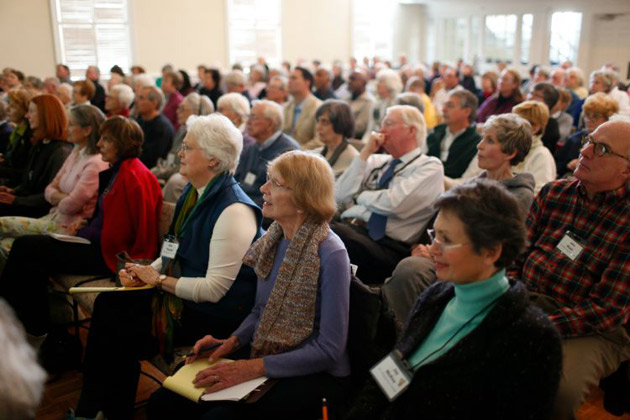
Celebrating Shakespeare during a milestone year for Bard lovers, the impact of social factors on health, and race issues in World War II films are among the Osher Lifelong Learning Institute at Vanderbilt offerings for winter 2016.
Other Vanderbilt Osher classes will examine Tennessee influences in American government, disorders of the brain and spinal cord, language and culture, and the impact of popular music on the civil rights movement.
“These noncredit classes, which are intellectually stimulating but do not require homework, are open to all those who are 50 and older,” said Norma Clippard, director of the Osher Lifelong Learning Institute at Vanderbilt. “We are also excited about this term’s ‘special offerings,’ which include a matinee performance of King Lear by the Nashville Shakespeare Festival.”
An $80 fee entitles Vanderbilt Osher students to take up to three of the nine classes. The following courses, which generally meet weekly for six weeks, are scheduled for winter 2016:
• Rhythms and Blues Tore Down the Walls of Segregation, taught by Grammy-winning Blair School of Music instructor Steve Buckingham. Buckingham played in integrated bands in the segregated South of the 1960s and became a music producer and record company executive. The class, which is offered in partnership with the Blair School, will meet from 9:30 to 11:30 a.m., beginning Jan. 18 at St. George’s Episcopal Church.
• Understanding Disorders of the Brian and Spinal Cord, taught by Jeanette Norden, professor of cell and developmental biology, emerita, in the School of Medicine. The class, which begins Jan. 19, will focus mainly on head trauma, stroke, brain tumors and Parkinson’s disease. Students will meet from 9:30 to 10:45 a.m. at The Temple.
• A Survey of the Political History of the United States: Tennessee Influences in American Government, taught by Carole Bucy, professor of history at Volunteer State Community College and the Davidson County historian. She earned her doctorate in history at Vanderbilt. Tennesseans who served or received presidential appointments, including cabinet members, Supreme Court justices and U.S. ambassadors, will be highlighted. This class meets at The Temple starting Jan. 19 from 11 a.m. to 12:15 p.m.
• What Makes You Sick, beginning Jan. 20 from 9:30 to 10:45 a.m. at The Commons Center. Rolanda Johnson and Betsy B. Kennedy, associate professors of nursing in the School of Medicine, will teach the course, which explores social circumstances that impact health, including socio-economic status, race and geographic location.
• Language and Culture, taught by Francille Bergquist, professor of Spanish, emerita. For this course, language is defined as the means by which we communicate the culture, and culture is the context within which we use language. The class, which begins Jan. 20, examines both of these concepts and how they depend on each other. Students will meet from 11 a.m. to 12:15 p.m. at The Commons Center.
• The “Double V” on the Silver Screen: Race Issues in World War II Films. The class will study the use of film as an agent of social change, including film depictions in the 1940s and ’50s aimed at helping blacks overcome racism and injustice. Frank Dobson, director of the Bishop Joseph Johnson Black Cultural Center, teaches the class, which starts Jan. 21, from 9:30 to 10:45 a.m. at The Commons Center.
• Climate Change Literature: a New Fictional Genre about a Real Problem, taught by Ed Rubin, University Professor of Law and Political Science. A new genre of modern novels has emerged—climate change fiction or “cli-fi.” This course will discuss a number of these books from the perspective of literature and also look at the underlying topic of climate change.
• Celebrating Shakespeare, taught by Ann Jennalie Cook, professor of literature, emerita, and vice president of the International Shakespeare Association. The year 2016 marks the 400th anniversary of Shakespeare’s death, and Cook will delve into the ebbs and excesses of Shakespeare in popular as well as scholarly culture over time. How homage to Shakespeare has shaped public education and various forms of the arts will be considered. This class begins Jan. 22 from 9:30 to 10:45 a.m. at Belle Meade United Methodist Church.
• Intellectual Sampler, taught by six Vanderbilt faculty members from a variety of fields that include literature, music, history and science. The class meets from 11 a.m. to 12:15 p.m. starting Jan. 22 at Belle Meade United Methodist Church.
There are also three special offerings with individual fees:
• Creative Writing Workshop, led by Kate Myers Hanson, who earned her MFA from the Iowa Writers’ Workshop. She previously taught at Northern Michigan University, where she served as editor-in-chief of the literary magazine Passages North. The 12-week course, intended for those interested in learning about crafting fiction and creative nonfiction, begins Jan. 18, from 1:30 to 3:30 p.m., at Belle Meade United Methodist Church.
• Osher Steel Drum Band, taught by Mat Britain, director of the Vanderbilt Steel Band Program. This seven-week class begins Jan. 17, from 1 to 2:30 p.m., at the Blair School of Music.
• Osher Lifelong Learning Institute at the Nashville Shakespeare Festival. Students will hear preparatory lectures from Denice Hicks, executive artistic director of the festival, and Marcia McDonald, professor of English at Belmont University, before attending a matinee performance of King Lear. This is the first professional production of Lear in Nashville in more than 100 years. The class begins Jan. 18, from 1 to 3 p.m., at the Troutt Theatre.
Click here to sign up for classes. For more information, email Norma Clippard or call 615-322-5569.